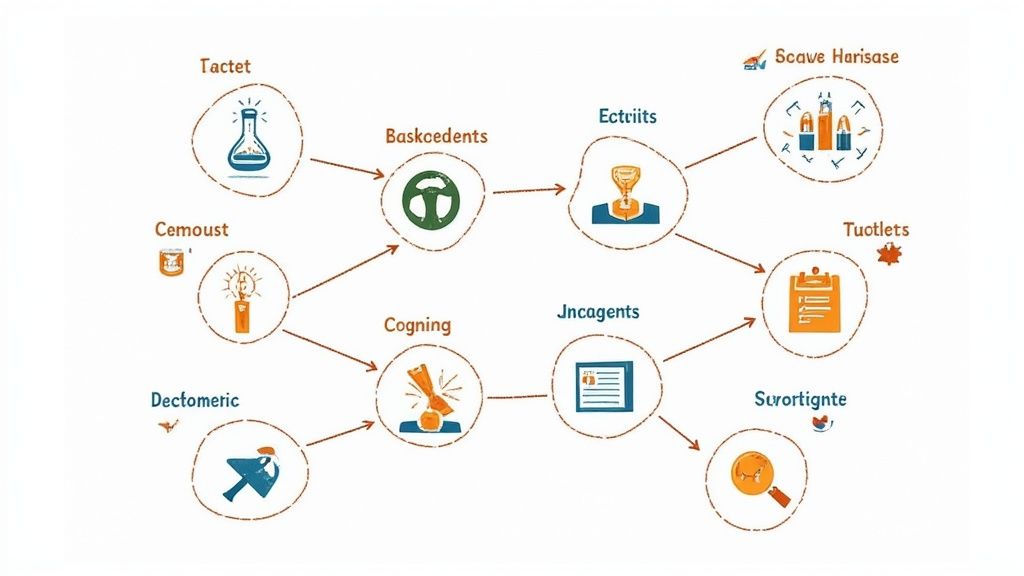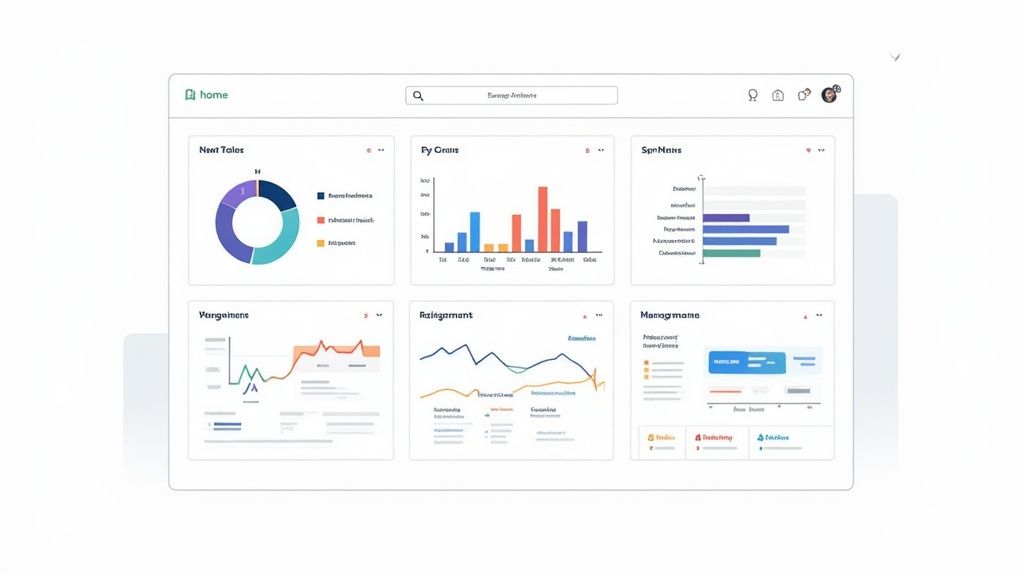Why Your Career Needs a Personal Marketing Plan
In today’s competitive job market, simply excelling in your role isn't always enough. You need a way to truly shine, to showcase your unique talents and attract exciting opportunities. This is where a personal marketing plan comes into play. It's your strategic roadmap to career success, highlighting your skills, experience, and aspirations. Instead of simply reacting to job openings, you'll be proactively shaping your career journey.
Understanding the Power of a Personal Brand
Think of your career as your own personal business, with you as the valuable product. Just like any successful product, you need a solid marketing strategy. A personal marketing plan helps you define your professional brand, identify your target audience (potential employers or clients), and articulate your unique value proposition. This isn't about boasting; it's about strategically positioning yourself to achieve your professional goals. For example, a software engineer aspiring to leadership roles might showcase project management skills and team leadership experience. A designer, on the other hand, might highlight a diverse portfolio and positive client testimonials.
The Difference Between Promotion and Strategic Positioning
Random acts of self-promotion are like throwing darts blindfolded, hoping to hit the bullseye. A personal marketing plan offers a focused, intentional approach. It helps you identify your strengths and weaknesses, analyze market opportunities, and craft a targeted message that resonates with your desired audience. This structured approach allows you to consistently communicate your value and cultivate a strong professional reputation. You might be interested in: How to master…
Personalization In the Digital Age

Personal marketing plans, particularly those emphasizing personalization, are crucial for success. The global revenue from customer experience (CX) personalization and optimization software is projected to exceed 9.5 billion US dollars in 2024, highlighting the growing importance of tailoring marketing efforts to individuals. Content marketing revenue, a sector heavily influenced by personalization, reached 85.6 billion USD globally. Personal marketing plans leverage this trend by using data to customize your self-presentation, making interactions more relevant and impactful. Learn more here: Personalized Marketing Statistics.
Building a Foundation for Long-Term Success
Without a personal marketing plan, professionals often encounter frustrating career plateaus. They may possess exceptional skills and dedication, yet lack the visibility and recognition necessary for advancement. By investing in a personal marketing plan, you're investing in your future. You gain control of your career narrative, build a powerful professional brand, and position yourself for continuous growth and exciting opportunities. This proactive approach ensures you're ready to seize those opportunities when they arise.
Conducting Your Personal SWOT Analysis That Actually Works

Creating a strong personal marketing plan starts with a powerful tool: the SWOT analysis. This involves an honest look at your Strengths, Weaknesses, Opportunities, and Threats. It's more than a business school exercise; it's a personal journey into understanding your professional potential. A well-done SWOT analysis gives you the clarity to make smart decisions about your career path.
Identifying Your Strengths
Begin by recognizing your true strengths. What skills and qualities make you unique? Consider what you do best and what others praise you for. Are you a skilled communicator? A natural problem-solver? Highly organized? Focus on concrete abilities, not just what you hope to be good at. This honest self-reflection is the foundation of your personal marketing strategy.
Acknowledging Your Weaknesses
Next, acknowledge areas where you can grow. This isn't about criticizing yourself, but about identifying opportunities for improvement. Do you struggle with public speaking? Is networking a challenge? Are there technical skills you need to develop? Recognizing these areas allows you to create a plan to address them, turning potential obstacles into stepping stones.
Recognizing Market Opportunities
Now, look outward. What market opportunities can help you advance your career? These are the external factors that can push you forward. Emerging industries? In-demand skills? Networking events? The rise of AI is a great example, presenting many opportunities for professionals with the right skill set. This outward focus connects your personal marketing plan with the realities of the market.
Spotting Potential Threats
Finally, consider potential threats. What external factors could slow your progress? Economic downturns? Shifting industry trends? Understanding these threats helps you anticipate challenges and prepare for them. For example, automation might affect some jobs, making it crucial for professionals to adapt. You might find resources like this helpful. This proactive approach helps you navigate the changing professional world.
To help you structure your SWOT analysis, consider using the following framework:
A Personal SWOT Analysis helps you organize your thoughts and create a roadmap for success. By carefully considering each category, you gain a deeper understanding of yourself and your potential.
| Category | Questions to Ask | Example Entries | How to Leverage |
|---|---|---|---|
| Strengths | What are you naturally good at? What skills have you developed? What do others compliment you on? | Excellent communication skills, Strong problem-solving abilities, Proficient in project management | Seek roles that require strong communication, Tackle complex projects, Lead project teams |
| Weaknesses | What skills could you improve? What tasks do you avoid? What do you find challenging? | Public speaking nerves, Difficulty with networking, Need to improve coding skills | Enroll in a public speaking course, Attend networking events and practice, Take online coding tutorials |
| Opportunities | What emerging industries align with your skills? Are there in-demand skills you could develop? What networking events could you attend? | Growing demand for AI specialists, Increasing need for data analysts, Local tech conferences | Pursue AI certifications, Learn data analysis tools, Network with professionals at conferences |
| Threats | Could economic changes impact your field? Are there technological advancements that could disrupt your industry? Is there strong competition for the roles you're seeking? | Economic downturn impacting hiring, Automation replacing certain roles, High competition for data science jobs | Develop skills in adjacent fields, Focus on uniquely human skills, Highlight your unique strengths and experience |
This table offers a starting point for your own personal SWOT analysis. Remember to tailor it to your specific circumstances and regularly revisit it as your career evolves.
Putting Your SWOT Analysis into Action
By honestly evaluating your strengths, weaknesses, opportunities, and threats, you gain valuable self-awareness. This allows you to create a targeted and effective personal marketing plan. You’ll be empowered to make smart choices, maximize your strengths, address your weaknesses, seize opportunities, and navigate potential challenges. This insight puts you in control of your career journey.
Crafting Your Irresistible Professional Value Proposition

A strong personal marketing plan depends on a compelling value proposition. This isn't just a memorable soundbite; it's the heart of what makes you invaluable to potential employers or clients. It answers the fundamental question: "Why should I choose you?" A well-crafted value proposition sets you apart and makes a lasting impression.
Defining Your Unique Intersection of Skills, Experience, and Passion
Your value proposition should be a concise, compelling statement that showcases the unique blend of your skills, experience, and passions. Consider it your professional "sweet spot." What are you truly exceptional at? What experiences have molded your expertise? What ignites your passion? Perhaps you're a project manager who combines technical skills with superb communication abilities and a driving passion for delivering exceptional results.
Distilling Your Complex Professional Identity into Clear Messaging
One common pitfall is attempting to cram everything into your value proposition. Instead, concentrate on the aspects most relevant to your target audience. What specific problems do you solve for them? What tangible benefits do you offer? Refine your complex professional identity into a clear, concise message that resonates with their specific needs. This focused approach amplifies the impact of your personal marketing efforts.
Learning from Successful Professionals
Many successful professionals have built their careers on a foundation of a powerful value proposition, leveraging their unique combination of skills, experience, and passion to create impactful positioning. They understand that a clear value proposition unlocks new opportunities. They’ve honed their messaging to emphasize what truly resonates with their audience. This strategic approach is a key ingredient in their career success. Find inspiration from professionals in your field who have achieved what you aspire to.
Testing and Refining Your Value Proposition with Feedback
Your value proposition isn't set in stone. It should evolve based on feedback and how the market responds. Test your messaging with colleagues, mentors, or even potential clients. Solicit honest feedback and be receptive to refining your value proposition based on their insights. This iterative process ensures you communicate genuine value that deeply connects with your target audience.
Frameworks for Communicating Value
Several frameworks can help you structure your value proposition effectively. One popular method is the Problem-Solution-Benefit framework. Clearly define the problem you address, the solution you provide, and the resulting benefits for your audience. This structured approach makes your value proposition easy to grasp and remember. Another useful framework is the Value Proposition Canvas, which helps align your offerings with customer needs. You can find more resources on this helpful.
By crafting a compelling professional value proposition, you lay the foundation for a successful personal marketing plan. You'll be well-equipped to attract the right opportunities and position yourself for continued growth and lasting success. This focused approach empowers you to take control of your career narrative.
Building Your Personal Marketing Plan That Delivers Results

Now that you understand your strengths, weaknesses, opportunities, and threats, and have defined your unique value, it's time to build your personal marketing plan. This plan translates your insights into action. It's the connection between knowing your worth and showing it to the world.
Identifying Your Target Audience
A strong personal marketing plan begins with understanding exactly who you're trying to connect with. Are you focused on potential employers in a particular field? Perhaps you're looking to attract clients for your freelance services? Defining your audience clarifies your message and directs you to the best communication channels.
Knowing your audience makes your marketing efforts more effective. It’s about speaking directly to the people who need to hear your message. This focused approach maximizes your impact and ensures you're reaching the right individuals.
Selecting The Right Channels
Knowing your audience guides you to the platforms they use. LinkedIn is essential for professional networking. Twitter may be better for industry discussions. Blogging on platforms like WordPress allows you to share expertise, while attending industry events offers face-to-face connection.
Choosing the right blend of channels allows you to connect with your audience where they’re most engaged. It’s about being present in the spaces where your ideal connections are already spending their time. You might be interested in: How to master…
To help illustrate the potential of different platforms, let's examine a comparison of several key channels. The following table outlines the strengths and weaknesses of each, offering insights into how they can best serve your personal marketing goals.
Channel Comparison for Personal Marketing
Analysis of different platforms and channels for personal marketing with their benefits, drawbacks, and ideal use cases
| Platform/Channel | Best For | Time Investment | Potential Reach | ROI Potential |
|---|---|---|---|---|
| Professional networking, job searching, industry insights | Moderate to High | Large professional audience | High for career advancement | |
| Industry discussions, thought leadership, news sharing | Moderate | Large, diverse audience | Moderate, depending on engagement | |
| Blogging (e.g., WordPress) | In-depth content sharing, showcasing expertise, building authority | High | Potentially large, depends on SEO and promotion | High for building a personal brand |
| Industry Events | Networking, lead generation, learning | Moderate to High (including travel time) | Targeted, specific audience | High for building relationships and finding opportunities |
This table highlights the unique benefits of each channel. Consider your goals, resources, and target audience when selecting the right mix for your personal marketing plan.
Developing Compelling Content
Content is at the heart of your plan. It's your voice, showcasing your value and expertise. Create content that demonstrates your abilities, such as blog posts, articles, or presentations. Share your unique insights on industry trends.
Valuable content draws attention and establishes credibility. It positions you as a thought leader and builds trust with your audience. By consistently providing value, you cultivate a loyal following and strengthen your professional reputation.
Setting Realistic Marketing Objectives
Your personal marketing plan needs clear objectives that align with your career aspirations. These objectives should be SMART: specific, measurable, achievable, relevant, and time-bound.
For example, if you're aiming for a new job within six months, your objectives might include expanding your network or publishing a specific number of articles. Well-defined objectives provide direction and motivation, keeping you focused on your desired outcomes.
Developing Meaningful Metrics
Track progress using relevant metrics. Measure website traffic, social media engagement, or job interviews. Analyzing these metrics informs your strategy and optimizes your approach. Data-driven decisions maximize your marketing effectiveness.
By 2025, personalization in marketing will be a key driver of customer loyalty and revenue growth. 89% of marketers see increased ROI with personalization. 60% of consumers are more likely to become repeat customers after a personalized experience. See more: Digital Marketing Statistics.
Creating Sustainable Routines
Consistency is crucial for success. Develop routines that fit your schedule. Dedicate time each week for content creation, networking, or other marketing activities. Even small, consistent efforts yield significant results over time. This builds momentum and solidifies your professional presence.
Digital Tools That Amplify Your Personal Marketing Impact
Building a robust personal marketing plan takes more than just a solid strategy. It requires having the right tools at your disposal. These tools can streamline your efforts, expand your reach, and help you forge deeper connections with your target audience. But with so many options available, choosing the right ones can feel overwhelming. This section cuts through the noise, focusing on the tools that truly make a difference.
Choosing the Right Tools For Your Needs
Different tools serve different purposes. Some are designed for content creation, while others specialize in analytics or networking. Understanding your specific needs is the first step in selecting the right tools. For example, if you're a writer, investing in grammar and SEO optimization software could be invaluable. If networking is your focus, prioritizing a CRM tool to manage connections might be more beneficial.
Content Creation and Distribution Platforms
For creating compelling content, consider tools like Canva for visually appealing graphics or Grammarly for polished writing. Distributing that content effectively is just as important. Platforms like Hootsuite or Buffer can streamline your social media presence by scheduling posts across various channels. Learn more in our article about How to master…. This organized approach frees up time and ensures consistent online visibility.
Consider platforms tailored to your chosen content format. If you're creating video content, explore tools like Adobe Premiere Pro for editing or Vimeo for hosting. If podcasting is your medium, Audacity offers a robust free option for audio recording and editing.
Analytics Tools For Measuring Impact
Understanding what resonates with your audience is key to refining your personal marketing plan. Google Analytics provides invaluable insights into website traffic and user behavior. Social media platforms also offer built-in analytics dashboards, tracking engagement metrics like likes, shares, and comments. This data offers critical feedback, allowing you to fine-tune your content strategy for maximum impact.
Automation Tools For Efficiency and Consistency
Automation tools can drastically improve your efficiency without compromising authenticity. Email marketing platforms like Mailchimp automate welcome messages and nurture leads. Scheduling tools help maintain a consistent posting schedule across your social media channels. However, remember the importance of the human touch. While automation handles repetitive tasks, genuine interaction and personalized engagement remain crucial for building meaningful connections.
Ethical Data Practices and Personalization
Digital marketing trends increasingly lean on artificial intelligence (AI) and machine learning to enhance personalization in individual marketing plans. This allows for more precise analysis of consumer behavior and preferences, enabling hyper-personalization. However, this power must be balanced with ethical data practices and building trust. For example, 68% of marketers plan to increase investments in technology-driven personalization while prioritizing data privacy in 2025. Find more detailed statistics here: Digital Marketing Trends. This demonstrates a growing commitment to balancing personalized marketing with ethical considerations.
By leveraging the power of digital tools, you can amplify the impact of your personal marketing plan. Focus on choosing tools that align with your individual goals and target audience. Remember, the true power lies not just in using the tools, but in using them strategically to propel your career aspirations forward.
Measuring What Matters in Your Personal Marketing Plan
A dynamic personal marketing plan isn't a "set it and forget it" endeavor. It requires regular evaluation and adjustments to ensure it continually delivers results. This means looking beyond superficial vanity metrics like follower counts. Instead, focus on meaningful key performance indicators (KPIs) that truly reflect your progress toward your career aspirations.
This section explores how to measure what genuinely matters and adapt your approach as your career journey unfolds.
Establishing Meaningful KPIs
The first step is to define KPIs that align with your professional goals. What are you hoping to achieve? If your goal is quality network growth, a relevant KPI might be the number of in-depth conversations you're having with influential people in your industry.
If your aim is opportunity generation, track the number of invitations you receive for interviews, speaking engagements, or exciting project collaborations. For example, if you're working to establish yourself as a thought leader, track how often your articles are shared or cited. This offers concrete evidence of your growing influence. These carefully selected KPIs provide a clear picture of your progress and help inform strategic adjustments.
Gathering Feedback: Quantitative and Qualitative
Effectively measuring your personal marketing efforts requires both quantitative and qualitative feedback. Quantitative data from website analytics tools like Google Analytics, social media engagement, and email open rates offer valuable insights into audience behavior.
However, qualitative feedback from conversations with mentors, colleagues, and your network can provide richer, more nuanced insights. What do people really think of your work and your contributions? This combination of data helps paint a comprehensive picture of your personal marketing performance.
Regular Personal Marketing Audits
Just as businesses conduct regular audits, you should periodically review your personal marketing plan. This isn't about obsessively checking your metrics every day. Instead, it's about setting aside dedicated time – perhaps quarterly – to assess what’s working, what's not, and what needs to change.
Read also: How to master… A simple framework for these audits might involve revisiting your SWOT analysis, reevaluating your target audience, and analyzing your progress toward your KPIs. This process can help you identify high-impact opportunities and refine your approach.
Adapting Your Approach Through Career Stages
As you advance through different career stages, your personal marketing needs will naturally evolve. Early in your career, the focus might be on building a foundational network and showcasing early wins. Later, the emphasis could shift toward thought leadership, mentoring, and building a legacy.
This means your KPIs and marketing tactics should adapt accordingly. A senior executive, for instance, might prioritize contributing to industry publications and mentoring junior colleagues, while a recent graduate might focus on building a strong LinkedIn profile and attending networking events. This adaptable approach ensures your personal marketing plan remains relevant and effective throughout your career.
Take Control of Your Narrative With Henri Den
Ready to build a personal brand that authentically reflects who you are and propels you toward your dream career? Henri Den offers personalized guidance and resources designed to help you craft a compelling personal narrative, master the art of self-marketing, and achieve lasting professional success. Visit Henri Den today and begin your journey to a fulfilling and impactful career.






